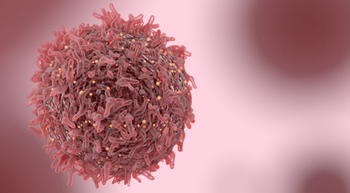
The FDA has approved momelotinib (Ojjaara) for the treatment of adult patients with intermediate or high-risk myelofibrosis, including primary myelofibrosis or secondary myelofibrosis, and anemia.

Kristi Rosa joined MJH Life Sciences in 2016 and has since held several positions within the company. Prior to working at the company, she served as lead copywriter and marketing coordinator at The Strand Theater. Email: krosa@onclive.com

The FDA has approved momelotinib (Ojjaara) for the treatment of adult patients with intermediate or high-risk myelofibrosis, including primary myelofibrosis or secondary myelofibrosis, and anemia.

The median progression-free survival with iruplinalkib was 27.70 months vs 14.62 months with crizotinib.

Selpercatinib led to improved progression-free survival in patients with advanced or metastatic RET-mutant medullary thyroid cancer.

The FDA has granted enzalutamide priority review designation based on data from the phase 3 EMBARK trial.

FoundationOne CDx is a next-generation sequencing–based in vitro diagnostic device developed to detect substitutions, insertion, and deletion alterations using 1 tissue sample.

Third-line lisocabtagene maraleucel induced a response in 97% of patients with relapsed or refractory follicular lymphoma.

The FDA has launched a priority review of fruquintinib as treatment for adult patients with previously treated metastatic colorectal cancer.

A 5-year analysis of the phase 3 KEYNOTE-426 trial showed continued benefit with pembrolizumab plus axitinib for patients with advanced treatment-naïve clear cell renal cell carcinoma.

Preoperative FOLFOX demonstrated noninferior efficacy outcomes vs preoperative chemoradiation in locally advanced rectal cancer.

Manufacturers believe that GEN-002/avelumab holds promise as a third-line option for patients with gastric cancer and PD-L1 expression.

The FDA has granted priority review status to a breast cancer optical imaging agent, Lumisight.

Minimally invasive distal pancreatectomy was a safe and effective alternative compared with open distal pancreatectomy in patients with resectable pancreatic cancer.

Combined treatment with capivasertib plus fulvestrant yielded a 5.5-month median progression-free survival for patients with HR+ advanced breast cancer.

Cemiplimab has received full approval for patients with metastatic basal cell carcinoma. The most common adverse events include fatigue, musculoskeletal pain, rash, diarrhea, and anemia.

Trifluridine plus tipiracil, with or without bevacizumab, has been granted priority review status for the treatment of refractory, metastatic colorectal cancer.

Combined adjuvant treatment with atezolizumab and bevacizumab was determined to deliver a statistically significant recurrence-free survival benefit to patients with resected hepatocellular carcinoma.

Patients with TKI-naïve and crizotinib-pretreated ROS-positive non–small cell lung cancer continued to show responses to treatment with taletrectinib.

AbbVie has withdrawn the indications for previously pretreated patients with mantle cell lymphoma and marginal zone lymphoma.

Patients with non-small cell lung cancer harboring exon 20 insertion mutations whose disease progressed after platinum-based chemotherapy continued to show responses to amivantamab in a long-term analysis of the CHRYSALIS trial.

Lasofoxifene may be helpful in managing vaginal/vulvar symptoms in women with estrogen receptor–positive/HER2-negative breast cancer harboring an ESR1 mutation.

In an all-randomized population of patients with advanced gastric cancer, gastroesophageal junction, or esophageal adenocarcinoma, adding nivolumab to chemotherapy yielded a 21% reduction in the risk of death.

The FDA has approved nadofaragene firadenovec-vncg for patients with high-risk non-muscle invasive bladder cancer.

Mosunetuzumab is now an FDA approved treatment for patients with relapsed or refractory follicular lymphoma who have already undergone 2 or more lines or systemic therapy.

Atezolizumab has been granted FDA approval for patients aged 2 years and older with unresectable or metastatic alveolar soft part sarcoma.

Combining ponatinib with reduced-intensity chemotherapy elicited a high rate of minimal residual disease (MRD)-negative complete remissions and no new safety signals in patients with Philadelphia chromosome–positive acute lymphoblastic leukemia.

The 1-year PFS rate among patients with metastatic, triple-negative breast cancer who received a combination eganelisib, atezolizumab, and nab-paclitaxel was 36%.

The FDA has approved brentuximab vedotin (Adcetris) in combination with doxorubicin, vincristine, etoposide, prednisone, and cyclophosphamide for pediatric patients with classical Hodgkin lymphoma.

The FDA has given the go-ahead to a combination of tremelimumab-actl (Imjudo) plus durvalumab (Imfinzi) and platinum-based chemotherapy for patients with non-small cell lung cancer and no EGFR mutations or ALK aberrations.

Cobimetinib is now an FDA-approved therapy for patients with histiocytic neoplasms.

Patients with multiple myeloma who have already undergone 4 lines of therapy, including a proteasome inhibitor, an immunomodulatory agent, and an anti-CD38 monoclonal antibody, may now receive treatment with teclistamab-cqyv (Tecvayli).